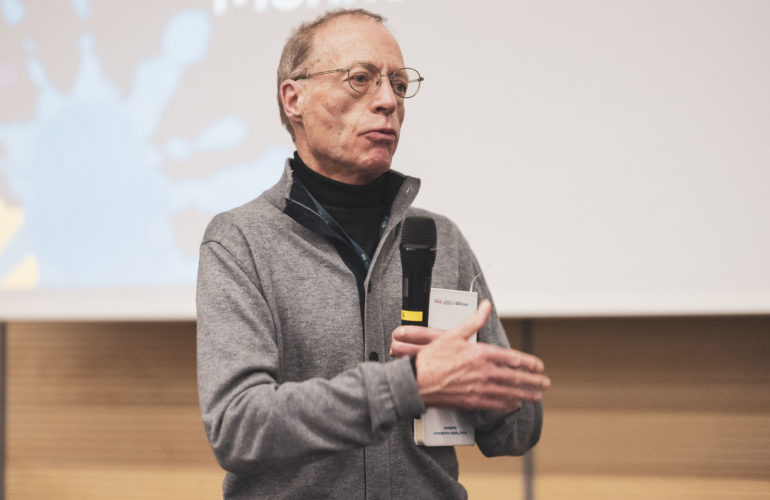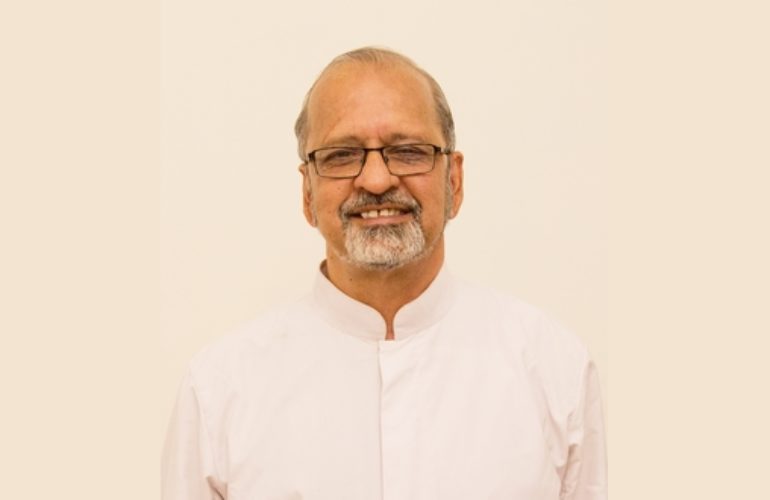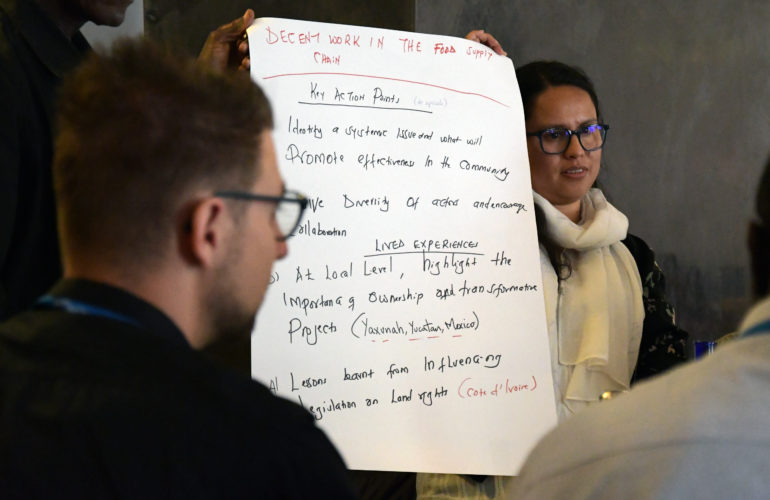ICMC Leads Jubilee Discussions on the Future of Work
ICMC’s “The Future of Work – Labour After Laudato si’” (FOWLS) Project formed part of the coalition of civil society organizations convening ‘World of Work, a Place of Hope: A meeting on the occasion of the Jubilee of Workers’, held in Rome
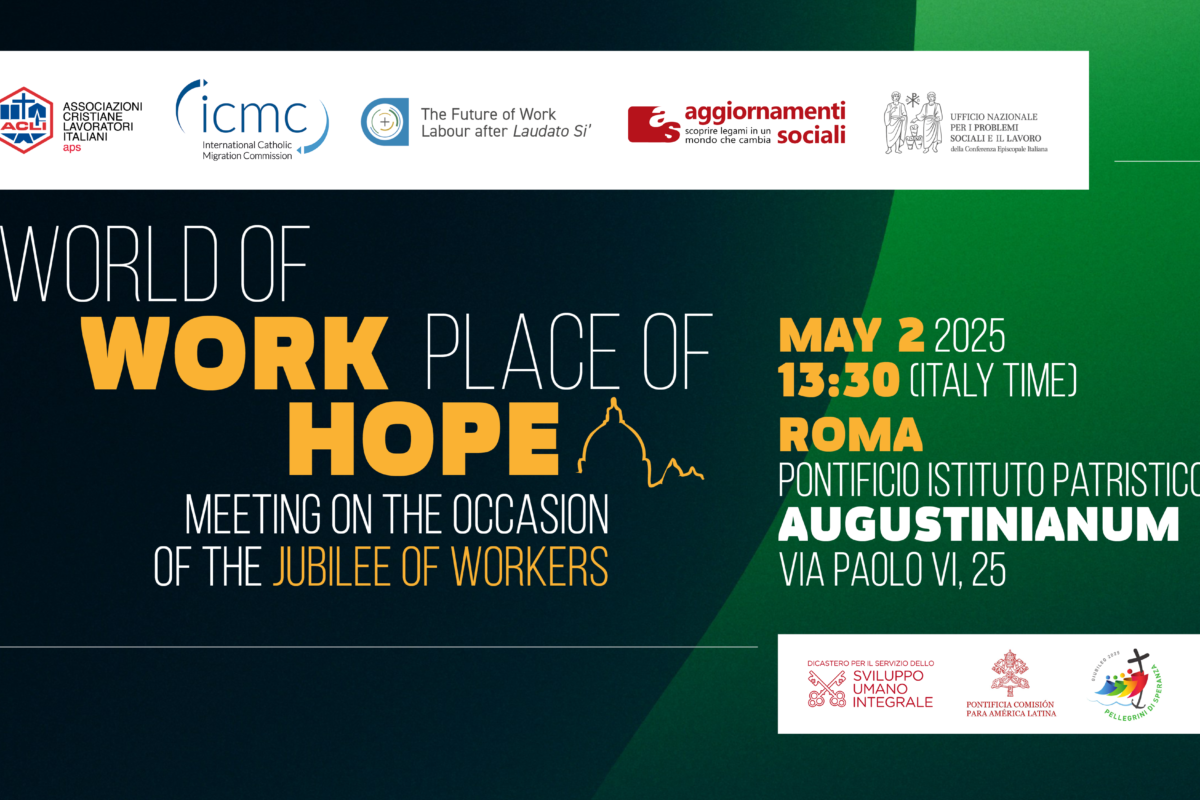
On 2 May 2025, more than one hundred representatives of trade unions, labor experts, international institutions and the ecclesial world gathered in Rome for ‘World of Work, a Place of Hope: A meeting on the occasion of the Jubilee of Workers’.
Co-organized by the ICMC-coordinated “The Future of Work – Labour After Laudato Sì’” (FOWLS) Project*, the Italian Christian Workers Associations (ACLI), Aggiornamenti Sociali, and ICMC, and sponsored by the Holy See’s Dicastery for Promoting Integral Human Development and the Pontifical Commission for Latin America (PCAL), this hybrid event addressed crucial issues for the world of work in 2025 and beyond.
The event was convened in the context of the Jubilee of Workers, which was scheduled on 1-4 May 2025, as part of the 2025 Jubilee Year declared by Pope Francis in the May 2024 papal bull titled ‘Hope Does Not Disappoint.’ Pope Francis officially inaugurated the Jubilee Year on Christmas Eve of 2024, calling on the global Church “to recover lost hope, to renew that hope in our hearts, and to sow seeds of hope amid the bleakness of our time and our world.”
In the 2025 Jubilee Year, the Jubilee of Workers was planned to be dedicated to honoring the dignity of labor and the contributions of workers worldwide, and invited workers from all sectors, labor organizations, and those committed to social justice to gather in a spirit of solidarity and reflection.
‘World of Work, a Place of Hope’ presented a clear vision for Church solidarity and action to promote a culture of work, grounded in the teachings of Pope Francis, in which work and wealth are redefined to include care, and work is understood as interconnected with all life.
“Work allows each person to participate in God’s Creation, enabling us to grow as individuals and contribute to our communities,” said Rita Sacramento Monteiro of the Economy of Francesco Foundation in her address to event participants. “The culture of work we promote allows for rest, regeneration, time for family, for spiritual life, and for contemplation.”
‘Care is Work, Work is Care’
‘World of Work, a Place of Hope’ took place following the sad loss of Pope Francis on 21 April. Those speaking paid tribute to his guiding vision of ‘work as care’, for one another and for our common home.
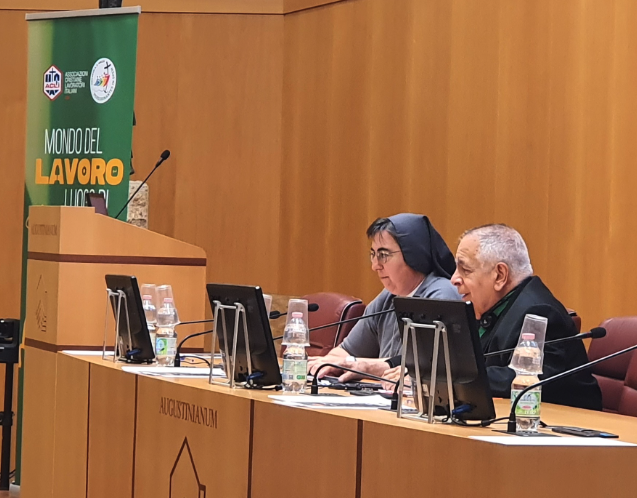
“In the midst of nine days of mourning for our dear Pope Francis, this meeting offers us a significant opportunity to reflect on his magisterium and action on the dignity of work and the contribution of workers to the common good,” reflected Sister Alessandra Smerilli, Secretary of the Dicastery for Promoting Integral Human Development. “Since the outset of his pontificate, his teachings consistently focused on work, in safe conditions and with just and fair wages, and on the relationship of work to integral human development.”
Reflecting on the vision set out in the May 2015 encyclical Laudato si’, in which Pope Francis called for work to take its place amongst the “comprehensive solutions” to contemporary social and environmental problems, speakers reaffirmed how Pope Francis’ teachings inform a shared vision of work underpinning Church action.
“Work has an ecological meaning: how we take from, provide for environment and nature, and how we can upset the balance,” said Paolo Foglizzo, Editor at Aggiornamenti Sociali. “For us, this notion of work as how we give and take care has a clear set of concrete, operational meanings. Work is not dignified if it creates harm, such as in the case of weapons production, or causes environmental degradation or excessive consumption of non-renewable resources. Work that has these impacts is not respectful of human dignity, even where workers’ rights are formally respected in terms of pay, working hours, security or trade union freedoms.”
“If work is a relationship, then it must include the dimension of care, because no relationship can survive without care. It must be a dimension of all work. Work that does not take care, that destroys Creation, that endangers the survival of future generations, does not respect the dignity of workers and cannot be considered decent. On the contrary, work that cares, that contributes to the restoration of full human dignity, will help to ensure a sustainable future for future generations.”
Address of Pope Francis to the 109th International Labour Conference, 17 June 2021
In a second event session dedicated to the Italian perspective, Pierpaolo Bombardieri, General Secretary of the Italian Labour Union (UIL), made a powerful plea for the dignity of workers to be at the center of Church and civil society advocacy and perspectives. “We must use hope to try to stay together, to change the model, because today work is just a commodity without recognition of the person,” he said. “We must instead forcefully say that it is the man and the woman who ennoble work, and be united in respect for the environment, respect for the dignity work. It is clear that the three large Italian unions have different origins and histories, but union pluralism is a beautiful strength because, in the end, we always find ourselves united on the great principles.”
Church Action and Cooperation on Work After Laudato si’: The FOWLS Project
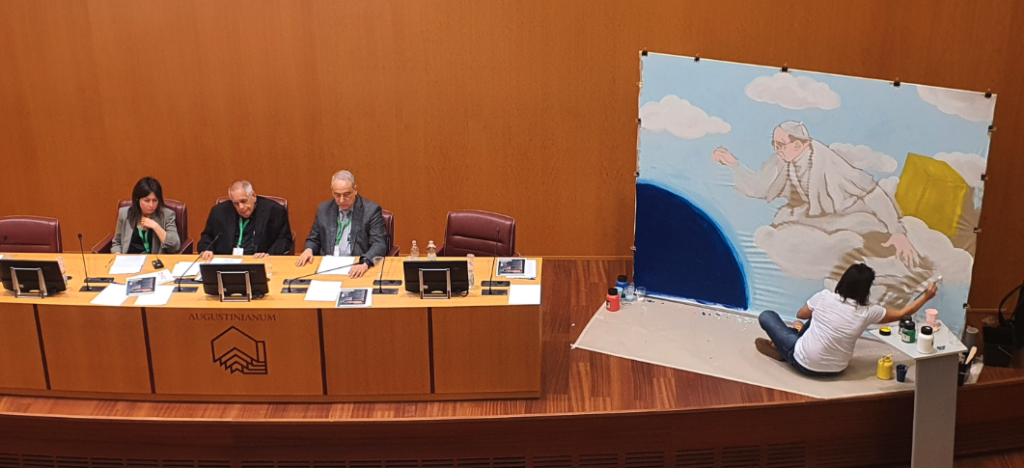
In his opening address, Monsignor Robert J. Vitillo, Senior Advisor to the Dicastery for Promoting Integral Human Development and former ICMC Secretary General, traced the contributions of both Pope Francis and Cardinal Silvano M. Tomasi to a coordinated Church voice and action on work via the establishment of “The Future of Work – Labour After Laudato sì’” (FOWLS) Project .
“Cardinal Tomasi noticed that many Catholic-inspired organizations came each year to the annual International Labor Conference in Geneva, but struggled to be given a significant voice there,” Msgr. Vitillo recalled. “He invited them to meet and join forces in their advocacy, and Pope Francis subsequently greeted this group when it gathered in Rome on the feast of St. Joseph the Worker in 2016. This gathering, alongside many others, led to the formation of “The Future of Work – Labour after Laudato si’” (FOWLS) Project in 2016, which has since distinguished itself through its strong networking, research, and advocacy that continues via occasions such as today.
Coordinated by ICMC, in collaboration with the Vatican’s Dicastery for the Promotion of Integral Human Development and the International Labour Organization, FOWLS engages Vatican institutions, trades unions, business associations, interfaith actors, academia, grassroots organizations, and youth movements in advocacy for policies that recognize care as work and work as care, and ensure workers’ rights and social justice.
“Together, we promote a culture of work that respects human dignity, including that of migrants and refugees, and the care of our common home,” said ICMC Secretary General Davide Bernocchi, reflecting on ICMC’s experience of coordinating the FOWLS Project for the past nine years. “Our experience has taught us that the world of work is a key place where people of goodwill collaborate to build social justice, for citizens and migrants. It is in these synergies that we see important signs of hope.”
‘Dignified Work for All?’ Vulnerable Persons and the World of Work
Throughout the ‘World of Work, a Place of Hope’ program, speakers highlighted how specific populations and sections of society are less able to access or benefit from opportunities for dignified and decent work.
ICMC’s Davide Bernocchi drew attention to the position of migrants and displaced persons. “Crises beget scapegoats, and in this modern era, migrants are often the first to be scapegoated, as are even those refugees whom the international community has committed to protecting” he cautioned. Calling for a renewed focus on the human dignity of migrant workers and their families, he highlighted how “work is a primary dimension of human dignity, and migrants are an increasingly important reality in the world of work. And yet they are too often treated as a ‘necessary evil’, as units of production or statistical phenomena, and not as human beings.”
Mariangela Perito, Women’s Coordinator at theItalian Christian Workers Associations (ACLI), presented a number of examples of how women are prevented from participating in the world of work, importantly including the exclusion of girls from education and training. “Women spend 2.5 times more of their incomes on housing and childcare than men, in a context of an ongoing gap in pay according to gender,” she added. “Access to work does not have the same emancipatory value for women as for men.”
Paola Simonetti, Director of Equality at the International Trade Union Confederation (ITUC),pointed to a global “repressive backlash on rights,” particularly in relation to gender equality. “In this context, there is a general need to increase labor market access for women,” she explained. “But we must also address the massive overexposure in sectors and professions that rely predominantly on the labor of women, such as care work.”
Others referred to the situation of young people in relation to the contemporary world of work, in particular, how work relates to their broader social and spiritual lives. “Even with work, so many young people still cannot break the cycle of poverty and develop integrally,” explainedRita Sacramento Monteiro of the Economy of Francesco Foundation, an organization formed by and dedicated to young people. “Young people desire to do meaningful work and to have the time to build their life projects, and these two dimensions are meant to be in a fruitful dialogue and not in opposition. We cannot accept an economy where people need to accumulate jobs and mortgage the other dimensions of their lives.”
Speaking from the Italian context, Secretary General of the Italian General Confederation of Labour (CGIL) Maurizio Landini pointed to a notable “change in the form of work and in the political culture of the country, in which the focus is no longer on the person but on the market and profit. In this new perspective, health and safety have a cost: they mean making less profit and therefore there are those who do not want to face these costs.”
Dignified Work at a Time of Global Transformation
Speakers and panelists consistently highlighted the profound processes of global transition affecting the contemporary world of work, and the challenges and risks this context creates for the dignity and wellbeing of working people.
“Work is at the heart of transformation processes: climate change and the ecological transition, technological innovation and the digital transition, human mobility and migratory movements, the growth of inequality, and the conflicts and wars that follow,” said Paolo Foglizzo of Aggiornamenti Sociali.“What risks being lost in such profound and sudden transformations is the dignity of working people, who often find themselves to be pawns at the mercy of seemingly uncontrollable forces.”
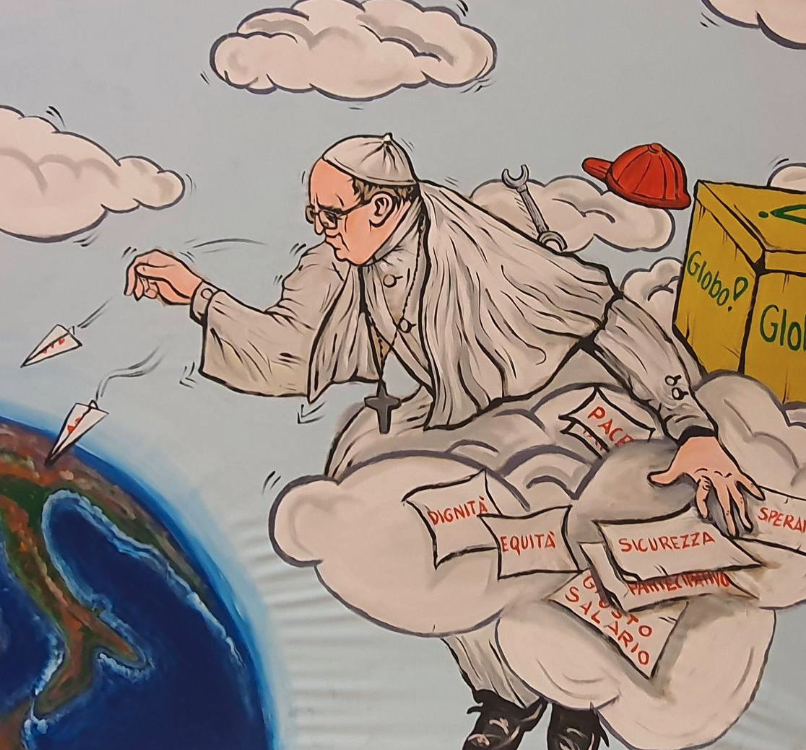
ICMC’s Davide Bernocchi highlighted the broad political challenges affecting international responses to global transitions, including in relation to how they impact the world of work. “At a time when global leadership and collective action are so desperately needed, we are instead witnessing an acceleration of the crisis of diplomacy, and a deterioration of the global multilateral system, international law, and human rights,” he reflected. “It seems we stand at the beginning of a new global era of greed, arbitrariness, injustice, and above all individualism.”
The ‘green transition’ to a net-zero carbon economy is one such global transition with far-reaching impacts for the world of work. “We have a very small window in which to limit global temperature change to below 1.5 degrees, and a rapid reduction in emissions and transition to a net-zero economy are imperative,” explained Peralta, Program Executive for economic and ecological justice at the World Council of Churches (WCC). “Our goal must be to ensure that the transition is fair and inclusive, especially for the workers and communities that are currently reliant on fossil fuels. Approximately seven million jobs in those industries will be affected, but the transition has the potential to create more than 22 million jobs by 2030, if it is done well.”
Speakers charted the advent of new technologies affecting the world of work, including the different contexts for advocacy and action for dignified work that they bring, and presented their recommendations for action to ensure the rights and dignity of workers in this context.
“We must be realistic about the potential impacts of Artificial Intelligence (AI) for contemporary work,” said Janine Berg, Senior Economist at the International Labour Organization.“There are limits to what AI can do, and it’s not intelligent enough to take over the vast majority of jobs in the world. Approximately 3% of global jobs will be directly affected by AI, so we’re not looking at a ‘jobs apocalypse’”.
Dr. Peter J. Warrian, Chair of the Lupina Foundation and research fellow at the University of Toronto, highlighted how the green transition is affecting the global mining sector. “The imperative to move forward on electrical vehicles and the energy transition means that we will have more mining in the future, not less,” he explained. “Robotics and digital technologies will eliminate some jobs and create others, while new modes of organization and supply lines will shift mining companies away from vertical organization. More remote working, in particular, means moving away from the onsite employment that has been the traditional focus of community and government policy concerns.”
Berg emphasized collective action to delineate the potential uses of AI and new technologies in the world of work, and the critical importance of including workers in this conversation. “The dignity of work is reduced by the excessive use of algorithms and chatbots. We need ‘red lines’ and prohibitions on the use of AI, and new technologies more generally,” she explained. “Given that it is workers who best know the realities of their jobs, we must ensure that they have a say in how technology is incorporated into their workplaces.”
Looking to the Future: Church Solidarity and Action for a Just Transition
Emphasizing the importance of tangible Church action, WCC’s Athena Peralta highlighted several examples of Church advocacy and solidarity ongoing around the world. “The Church is standing with communities harmed by what we would term as the ‘unjust transition’,” she explained, highlighting Church support for the Sámi in Northern Finland whose hunting practices are being disrupted by green transition measures, and for communities affected by extractive mining for minerals needed for green transition across Africa.
ICMC’s Davide Bernocchi urged a recentering of the dignity of all persons as the core guiding principle of Church advocacy and action. Calling for “a collective return to the anthropological and theological foundations which are now being questioned”, he recalled the words of Pope Francis in his February 2025 letter to the United States Bishops: “Jesus Christ, loving everyone with a universal love, teaches us to permanently recognize the dignity of every human being, without exception. In fact, when we speak of ‘infinite and transcendent dignity’, we wish to emphasize that the most important value that the human person possesses surpasses and supports every other juridical consideration that can be made to regulate life in society. Therefore, all Christian faithful and people of good will are called to reflect on the legitimacy of public norms and policies in the light of the dignity of the person and his fundamental rights, and not the other way around.”
Despite the broad context of global political challenges for multilateral cooperation and international action, speakers identified a number of opportunities and venues for Church advocacy, dialogue, and international cooperation on work and the just transition.
One such venue is the Second World Summit for Social Development, which takes place on 4-6 November 2025, in Doha, Qatar, and aims to recommit to the Copenhagen Declaration on Social Development, and provide new momentum toward the implementation of the 2030 Agenda for Sustainable Development.
“The Summit will be a key forum for us to collectively present a spiritual vision of social development, in which work is not just about survival but rather a way to find your place in society,” stated Paola Simonetti, presenting the ITUC’s Political Declaration on Key Priorities for the Summit. “We must together recognize the major global challenges impacting the world of work, and ensure the concerted cooperation and action by governments, employers, and workers as the key building blocks for social justice, democracy, and peace.”
The just transition will also be a key focus of the upcoming United Nations Climate Change Conference (COP30), taking place in November in Belém, Brazil, specifically in relation to how national development priorities and policies can ensure decent and dignified work.
“Both national priorities and actions emerging from the COP process must be rights-based, with robust worker protections,” said Athena Peralta of WCC. “At this COP30 we would like to see an increased focus on sectors with major implications for global work, such as agriculture, which represents more than 2.5 billion jobs worldwide, and for the international community to provide financing for the transition to affected States, importantly in the form of grants rather than loans.”
****
* Find out more about “The Future of Work – Labour after Laudato sì’” (FOWLS) Project coordinated by ICMC.

Rachel Westerby
Independent writer and researcher on migration and refugees.

